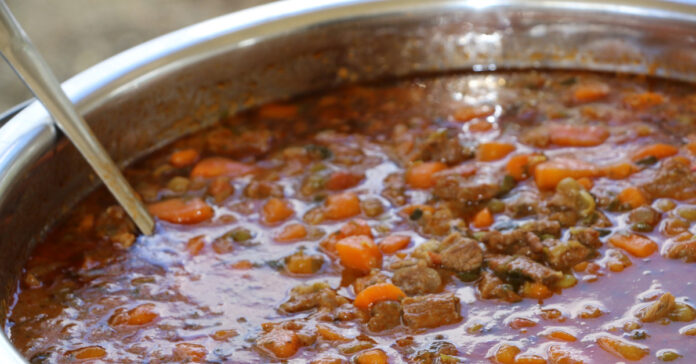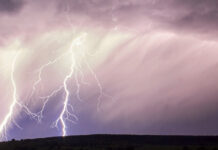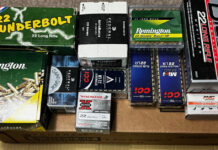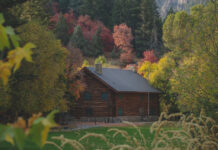In my writings, I frequently assume that people who would go to the trouble of making their way to our remote property after the SHTF are likely looking to rob from us, steal our livestock or preps, or even kill us and take over our retreat. You might think I am suspicious by nature, but I’d argue it’s because I’ve seen human nature, and much of it is bad.
If a woman with a hungry child shows up begging for food, I’d assume she scouting us out and will take anything she learns back to a larger group who will then use that intelligence to determine if we are worth attacking and, if so, how to go about it. That means we intercept her at or before she reaches the property line and she doesn’t enter the house or see our preps or our defenses.
But what if she is just a hungry woman with a child? What if the person who shows up asking for food is a neighbor you know and they are asking for charity? How would you handle that?
Charity After the SHTF
Over at Survival Blog, Jim has always advocated stating that they have given all their excess to the local church which is coordinating handouts, has a soup kitchen, or whatever. This keeps you out of the loop. I think that is an excellent solution for feeding or helping strangers like the woman in the scenario above.
But what if the neighbor who you know well, who has loaned you his tools and whom you have helped and vice versa, shows up three weeks after the SHTF and says, “Hey, we’re kinda low on food. We have a dozen of jars of pasta sauce my wife canned up last year, but I’m out of pasta. Can you help me out?”
I think you have to answer, “Of course. Let me ask my wife what we can spare.” This reflects not only that you are friends and have had a good relationship with this neighbor, but you might need each other in the future. Helping him out is not only the morally correct thing to do, it’s the right thing to do for your mutual benefit.
I’d put together a care package with some fresh eggs, a box of spaghetti, a couple boxed of macaroni, a quart size baggie of white rice, some dried beans, a couple ramen packets, some oatmeal, and maybe a can of chili or stew. Then I’d promise to stop by with a loaf of bread the next time my wife bakes bread. On my visit, I’d drop off some honey with the bread, and I’d say something like, “You know those flower beds in front of your house? I can give you seeds for some cabbage, squash, green beans, and zucchini seeds to plant in the spring. Of course, you’ll have to dig up the bulbs first.” That might get a conversation going.
The Bad Neighbor
Let’s imagine the guy down the road stops by a week later. He says he’s sick and tired of hearing your rooster crow at all hours of the day and night and demands you give him some of your eggs. You don’t know his name, but you and your spouse refer to him as “the angry guy.” He’s the guy who never waves when your pass each other on the road, whose dogs run loose and have eaten one of your chickens and killed another neighbor’s cat. He beat his last girlfriend until she left him, and the sheriff has arrested him several times for a variety of infractions. You’re 90 percent sure he’s hunted on your land without permission and people have warned you not to get on his bad side. What do you do then?
Your gut tells you that if you feed him, he’s never going to be satisfied. He’ll always want more, and he may try to take it by force. If you don’t feed him, you’ll probably catch him raiding the hen house or worse. He may also round up some other ne’er-do-wells and try to raid your place, and you’ll end up in a gun battle.
If he’s irredeemable, I’m tempted to say shoot him right then and there. Yeah, I get it, that’s neither legal nor moral, but after a major SHTF event, we won’t be living in a society with the rule of law. I expect morals will quickly devolve into doing whatever it takes to survive and protect your family. Remember, they shoot rabid dogs because they are a threat to society.
Maybe you can decline, telling him they aren’t laying much, and recommend he visit the church for a handout. If he gets angry and threatening, then you can shoot him and can claim self-defense should anyone ever show up to prosecute. Perhaps that will help you sleep better at night. You’ll just have to hope he doesn’t have family nearby who will want to revenge him. Whether or not you feed him, this guy is trouble and you need to be wary.
What NOT to Give Away
Assuming you do occasionally hand out food, I would avoid giving anything that resembles prepper food. Don’t give out MREs, pouches of freeze-dried foods, or anything in a #10 can. If you are eating from a 5-gallon pail of rice or oatmeal, tell the person to bring a pint or quart jar, and fill it up from your bucket. Don’t let anyone see the extent of your preps or that you have long term preps. Giving away fresh food everyone can see you produced or have harvested is best because it is easy to explain why you have it.
I would hesitate to give away things like flashlights, headlamps, cast iron cookware, solar charging equipment, communications gear, and other items that are no longer being made after a world-altering event. Anything I have a very limited supply of, like gasoline or chain and bar oil, is going to be used by me or in a high-value trade and not just handed out. My first responsibility is to me and mine, and of those six headlamps I have, only three might still work in a year.
I’d also be cautious about handing out ammunition and guns unless you know and trust the person or you fear your area is going to be attacked by outsiders and you need to arm your neighbors to help fight them off. For example, if a neighbor needs .30-30 rounds to shoot some game, I’d give him five rounds and tell him to bring back the shells so I can reload them. Five should be more than enough to put meat on the table. I might be more inclined to do it again if he brings me some venison.
Feeding the Neighborhood
Let’s assume you shoot a large game animal. This is when you can be generous with the neighbors. Make a big batch of stew using the meat, plus potatoes and carrots from your garden. Then invite the neighborhood, and tell people to bring their own plate, utensils, a cup, a folding chair, and a mason jar. Ladle out generous helpings of stew. At the end, take their jars and give them some fresh meat to take home and cook the following day. Tell them you will return the jar full of canned meat in a couple of days. After all, without refrigeration, you won’t be able to keep it all unless it is very cold out. Maybe one or two of the neighbors will volunteer to help and even bring their own canner, jars and lids. Of course, you’ll give them more canned meat than the folks who don’t help.
In this scenario, no one is going to blame you if you eat the backstrap yourself or if you dry some meat and keep most of the canned meat. You may start a tradition in which other hunters invite people over and share their bounty. That could be the start of the neighborhood working together.
Your Best Bet
Let’s assume you have a close friend in the area with whom you and your families get along. Your kids are friends, the ladies go out together, and the guys hang out and watch sports. Unfortunately, they are not preppers, choosing to spend money on dining out rather than building a prepper pantry. Despite this, they are reliable and trustworthy. Rather than supporting them with gifts of food, your best bet might be to invite them to live with you. This “doubling up” will not only allow you to feed your friend and his family, but it increases the number of adults on hand to do things like stand guard, defend the home, care for the children, cook, garden, tend the livestock, do the laundry, etc. Without electricity and with limited or no machines, you are going to need strong hands and backs.
Then, if people ask for food, you can decline, saying you are already feeding two families.
A Few Additional Thoughts
As I alluded to above, I think you need to be prepared to operate under a different set of ethics during the worst of a post-disaster scenario. Our job as survivalists is to survive, to protect our family and friends, to make it through the disaster and its aftermath alive, and then to help rebuild society. In a world-ending disaster, that might mean turning away strangers who need help. It might mean letting your kids go hungry to help a friend. On the other end of the scale, it might mean killing people who are trying to kill you and yours. It might also mean killing people who are a threat, even if the threat has not yet proven to be lethal. Those “you loot we shoot” signs mean nothing if they are not occasionally backed up with gunfire.
I realize it’s easy to talk (or blog), but it might be harder to act when the time comes. I can’t predict the variables or the situation we might face, but having considered a scenario makes me more prepared for it than someone who has never contemplated the idea. If you are familiar with the “reasonable man” standard as it applies to justifiable homicide, just remember that what is reasonable after the nukes destroy half the population and knock out utilities to the other half is going to differ from what it is reasonable today, just as what is reasonable today is going to be different from what was reasonable in 1959.








